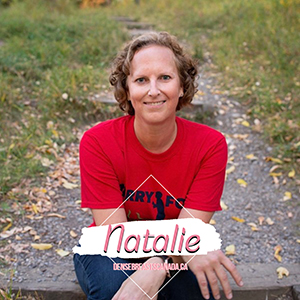Natalie

In February 2019, I found a small lump – the size of a split pea – in my breast. I wasn’t particularly worried as I was only 46, which doesn’t even qualify me for a mammogram. In Alberta, you only start getting a mammogram every other year once you turn 50. It’s no wonder I assumed that I was too young for breast cancer. My GP referred me for a mammogram and an ultrasound. And, the following week, after getting my imaging done and waiting for the Radiologist to confirm he had all the images he needed, I didn’t flinch that he came to talk to me. I wasn’t expecting what he told me. He was extremely concerned about what he saw and immediately booked me in for a biopsy and to the Breast Health Clinic at the Foothills Hospital. Within a few weeks, I was diagnosed with an aggressive form of stage 4, breast cancer.
It wasn’t until I met my medical oncologist to discuss my treatment plan that I received a copy of my mammogram, ultrasound, and biopsy reports. Upon reviewing it, it read: ” Volpara Breast Density Score: D.” Little did I know that having a D density score significantly decreased the sensitivity of mammography to see cancer. Had I known, I would have pushed for an ultrasound as well. This wasn’t my first mammogram as I had found lumps in the past. But my mammograms were clear. Because I was “too young for regular screening”, the only way I would get further screening was if I found another lump. Unfortunately, by the time I did find that lump, the cancer had already spread to my lymph nodes, spine, sternum, and ribs. It was too late for me to live a long life. My prognosis was 22% of living the next 5 years, which translates to a two- to three-year life expectancy.
At 23 months after my initial diagnosis, my cancer spread to my hip. I wasn’t overly surprised given that I had basically reached the two-year mark of my “two- to three-year life span.” I’m theoretically in my last 6 months of life, though I hold out hope since the cancer appears to be stable again. However, a part of me thinks my prognosis was entirely preventable. Had I known my breast density score and been able to push for more imaging in my 40s, I suspect we would have found it earlier, giving me a much different prognosis. Now, I worry that my children who are 5 and 7 years old, will grow up without a mom.
